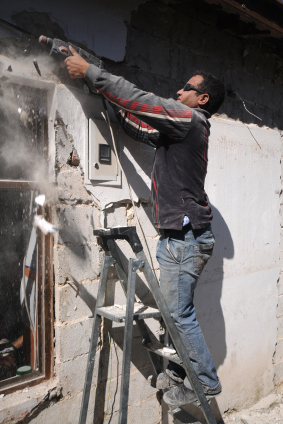USING RENOVATION LOANS
 Given the proliferation of short sales, foreclosures and lender-owned properties (REOs), it is not uncommon for buyers to come across homes that may be very well price (a "steal") but need substantial renovation work to bring them up to the desired quality and functionality level.
Given the proliferation of short sales, foreclosures and lender-owned properties (REOs), it is not uncommon for buyers to come across homes that may be very well price (a "steal") but need substantial renovation work to bring them up to the desired quality and functionality level.
Many of these homes have been neglected for a long time: Initially their owners (who experienced a financial hardship of some nature) did not have the money or the inclination to do normal maintenance and upkeep. Then the home is normally vacant for a period of time, while the lender takes it to foreclosure and resolves all the legal title issues to be able to re-sell it. Usually all the utilities are off during this time.
The most common problems that we normally see in distressed homes are: Roof leaks, moisture problems, termite damage, mold, rot damage, vegetation overgrowth and vandalism (sometimes caused by an irate homeowner who gets "even" with the lender by causing damage to the property or taking away some of the fixtures). While many of these are minor, there are some that may cause serious problems closing a loan with a new lender and some that can be very costly to fix. If the buyers ask for a termite and rot inspection contingency as part of their contract, the lender will normally require a "clear" CL-100 (termite and moisture damage letter). Most distresses properties will not get a clear CL-100 letter. And neither the owners (in the case of a short sale) nor the lenders (in the case of an REO) want to fix anything, normally these homes are sold "as-is". This creates a real conundrum for the buyers.
Enter the RENOVATION LOAN. The two most common renovation loans are the FHA 203 K (streamlined for $5K-$35K or full for larger amounts) and the HOMEPATH RENOVATION LOAN for Fannie Mae-owned properties. Buyers can finance the purchase of the property PLUS the cost of the renovation, as long as they qualify for the total loan amount. If you use a renovation loan, the lender will not require to have a clear CL-100 since it is assumed that the rehab will include fixing all the defects found in the inspections.
There are a few issues to bear in mind when buying properties using renovation loans:
- It normally takes 45-60 days to close a renovation loan (about double the time required for a conventional of FHA loan). Thus, the contract needs to allow ample escrow time.
- They require a detailed renovation plan, plus quotes from licensed contractors. In the case of a full 203K, the buyer must hire an FHA203K-qualified consultant to put together and submit the proposal.
- Buyers need to be careful to not over-capitalize the home (i.e. it is not wise to over-invest on a home so that the price falls out of the neighborhood average)
Questions? Leave us a message on 843-416-1434 and we'll get back to you with an answer.

The Alan Donald Real Estate Team provides professional Buyer and Seller representation in the Charleston, SC metro area. Contact us for a no-obligation consultation.






Please contact us if you have any questions or comments.